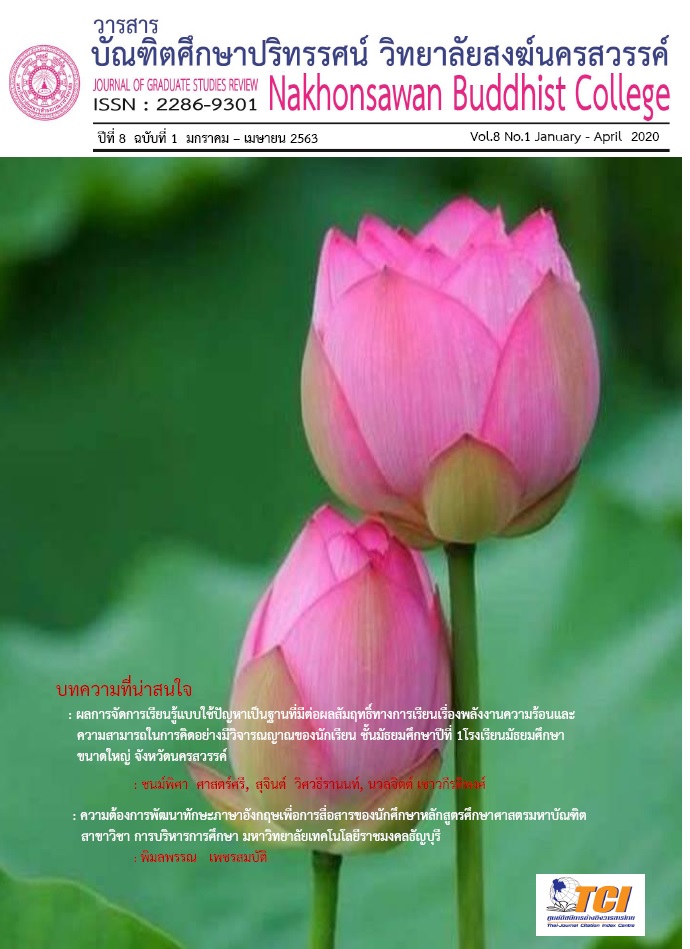ศึกษาวิเคราะห์ความเชื่อในประเพณีที่ปรากฏกลุ่มชาติพันธุ์ไทภูคัง ตามหลักพระพุทธศาสนาเถรวาท
Main Article Content
บทคัดย่อ
การวิจัยเรื่อง ศึกษาวิเคราะห์ความเชื่อในประเพณีที่ปรากฏในกลุ่มชาติพันธ์ไทยภูคังตามหลักพระพุทธศาสนาเถรวาท มีวัตถุประสงค์ คือ 1) เพื่อศึกษาความเป็นมาของกลุ่มชาติพันธุ์ไทภูคัง 2) เพื่อศึกษาความเชื่อในประเพณีของกลุ่มชาติพันธ์ไทภูคัง และ 3) เพื่อศึกษาวิเคราะห์ความเชื่อในประเพณีที่ปรากฏในกลุ่มชาติพันธ์ไทภูคังตามหลักพระพุทธศาสนาเถรวาท กลุ่มเป้าหมายของการวิจัย ได้แก่ กลุ่มผู้นำทางพระพุทธศาสนา กลุ่มผู้นำท้องถิ่น และประชาชนในท้องถิ่นที่มีเชื้อสายไทภูคัง การศึกษาวิจัยนี้ เป็นการวิจัยเชิงคุณภาพภาคสนาม โดยการเก็บข้อมูล และการสัมภาษณ์เชิงลึก (In-depth Interview)
ผลการวิจัยพบว่า
- 1. คำว่า ไท ในภาษาลาว เป็นคำกลางๆ หมายถึง คน ส่วนในภาษาไทย คำว่า ไท มีหลายความหมาย สำหรับงานวิจัยนี้ คำว่า ไท หมายถึง กลุ่มคน หรือชาติพันธุ์ ดังนั้น คำว่า ไทภูคังจึงหมายถึง กลุ่มคน หรือชาติพันธุ์ที่มีถิ่นฐานเดิมมาจากภูคัง อันเป็นหัวเมืองลาวอยู่ฝั่งซ้ายแม่น้ำโขง ตามความเชื่อเดิมแต่ในปัจจุบันมีนักวิชาการได้แสดงหลักฐานว่า เป็นเมืองหนึ่งในแขวงเมืองเอกพิษณุโลก ส่วนกลุ่มชาติพันธุ์ไทภูคังในจังหวัดกำแพงเพชร ที่เป็นกลุ่มเป้าหมายในการทำวิจัยนี้ มีหลักฐานว่าเป็นคนไทยเชื้อสายลาวที่อพยพมาจากบ้านโคกหม้อ ตำบลโคกหม้อ อำเภอทัพทัน จังหวัดอุทัยธานี และบ้านกุดจอก ตำบลกุดจอก อำเภอหนองมะโมง จังหวัดชัยนาท ซึ่งมีสำเนียงพูดเป็นสำเนียงลาวเวียง
- 2. กลุ่มชาติพันธุ์ไทภูคัง มีวิถีชีวิตความเป็นอยู่ในสังคมเกษตรกรรมตามสภาพแวดล้อมทางธรรมชาติมีความเชื่อว่าความผาสุกและเจริญรุ่งเรืองจะบังเกิดแก่ครอบครัวและบ้านเมืองได้โดยอาศัยพิธีกรรม เซ่นสรวงบูชาสิ่งศักดิ์สิทธิ์และทำบุญตามประเพณีทางพุทธศาสนา โดยในทุกเดือนของรอบปี มีการจัดงานบุญพื้นบ้าน-ประเพณีพื้นเมืองเป็นประจำ ที่เรียกกันว่า ฮีตสิบสองคองสิบสี่ เป็นแนวทางที่ใช้ปฏิบัติระหว่างกันของผู้ปกครองกับผู้ใต้ปกครอง และระหว่างพระสงฆ์กับบุคคลทั่วไป เพื่อความสงบสุขร่มเย็นของบ้านเมือง ซึ่งหากใครที่ถือปฏิบัติอย่างเคร่งครัดแล้วนับเป็นบุคคลอยู่ในศีลในธรรมเป็นที่เคารพนับถือของคนทั่วไป
- 3. กลุ่มชาติพันธุ์ไทภูคังที่ได้นำความศรัทธาในพระพุทธศาสนา และการทำบุญมาผสมผสานกับความเชื่อในเรื่องของผีบรรพบุรุษ ที่เรียกว่า การทำบุญฮิตสิบสอง หรือการทำบุญเพื่อทำความดีในแต่ละเดือน 12 เดือน โดยการนิมนต์พระสงฆ์มาร่วมพิธีต่างๆ และสวดมนต์ เพื่อความเป็นสิริมงคล และได้ใช้หลักความเป็นเหตุเป็นผลของความศรัทธาของพระพุทธเจ้ามาเป็นเครื่องยึดเหนี่ยวจิตใจ ซึ่งนำมาสู่ปัญญาในการประกอบพิธีกรรมตามความเชื่ออย่างไม่งมงาย ความเชื่อในประเพณีของกลุ่มชาติพันธุ์ไทภูคัง จึงมีลักษณะเป็นหลักของความประพฤติที่เรียกว่า “จริยธรรม” มากกว่าจะนำเสนอหลักพุทธธรรมที่เป็นสัจธรรม โดยแบ่งเป็น 2 ประการ คือ 1. พุทธจริยธรรมทางสังคม เป็นหลักคำสอนที่เป็นบรรทัดฐานของคนทุกคนทุกหมู่เหล่าในสังคมที่จะต้องปฏิบัติร่วมกัน ได้แก่ ศีลห้า การทำบุญทั้งสิบสองเดือน และความเคารพบูชา ต่อบุคคลที่เจริญด้วยคุณวุฒิ วัยวุฒิ และเป็นผู้มีพระคุณ ความเป็นคนอ่อนน้อมถ่อมตนเชื่อฟังผู้มีอาวุโส และการรักษาแบบแผนประเพณีของกลุ่มชาติพันธุ์ไทภูคังให้มีการปฏิบัติสืบต่อกันอย่างไม่ขาดสาย 2. พุทธจริยธรรมของปัจเจกบุคคล เป็นหลักปฏิบัติของบุคคลที่มีสถานภาพทางสังคมแตกต่างกัน ตามฐานะหน้าที่ของตนเอง เช่น หน้าที่ของสามี หน้าที่ของภรรยา เป็นต้น
Article Details
ประเภทบทความ
บทความวิจัย (Research Articles)


